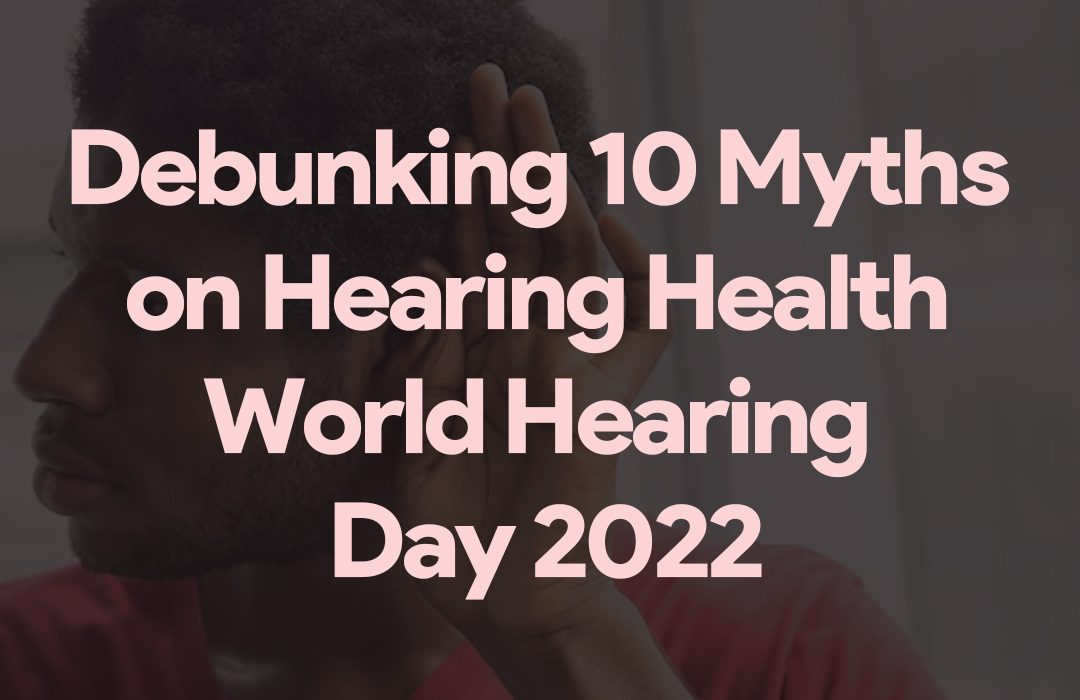Debunking 10 Myths on Hearing Health – World Hearing Day 2022
March 3rd marks a global initiative dedicated to one of our most vital senses—World Hearing Day. This year, we are proud to join the cause, focusing on overcoming societal misperceptions and stigmatizing mindsets surrounding hearing health. The key to this transformative journey is awareness-raising and information-sharing, not just among the public but also within the healthcare provider community.
This blog post address 10 of the misperceptions surrounding hearing health; take this as your backstage pass to the myths, emotions, and stylish solutions of hearing health. So, come along with us.
Myth 1: Only seniors experience hearing issues.
Reality: Definitely not! Hearing issues aren’t exclusive to seniors; Ears don’t check IDs; hearing hiccups can happen at any age! People of all ages can experience challenges with their hearing. Whether you’re a teenager enjoying your favorite tunes or navigating the hustle and bustle of adulthood, hearing health is relevant to everyone. It’s essential for people of all ages to be mindful of their hearing and seek timely care if any issues arise.
Myth 2: Hearing aids are bulky and unattractive.
Reality: Absolutely not! Time to toss out the old mental image of clunky hearing aids! The days of bulky and unattractive hearing aids are long gone. Today’s hearing aids are small, discreet, sleek and modern, and even stylish but blending seamlessly into your lifestyle. Who said hearing aids can’t be both functional and fabulous?
Myth 3: Noisy jobs are the only culprits for hearing problems.
Reality: Nope, it’s not just about the noise on the job! While loud workplaces can contribute, various factors, like exposure to loud music, recreational activities, or even everyday sounds, can impact your hearing. It’s like your ears are delicate superheroes – they need protection from all kinds of “villains.”
Myth 4: Hearing loss only affects the ears.
Reality: Hearing loss doesn’t just stop at the ears and isn’t just a volume knob issue; it plays with emotions too. It can have a ripple effect on mental health, social interactions, and overall quality of life. It’s like a silent concert for the heart and acknowledging the emotional side is crucial. That’s why taking care of your hearing isn’t just about what you hear but how you live. Let’s nurture those ears and the joy they bring to life!
Myth 5: Communication difficulties always indicate cognitive decline.
Reality: Nope! Communication difficulties don’t always point to cognitive decline. While there can be an association, various factors, including untreated hearing loss, environmental conditions, or stress, can contribute to challenges in communication. It’s essential to consider multiple factors and seek professional advice for a comprehensive understanding of the situation. Addressing communication difficulties early, especially related to hearing health, can positively impact overall cognitive well-being.
Myth 6: Ignoring minor hearing issues is harmless.
Ignoring minor hearing issues is not harmless and can have significant consequences. Even seemingly minor changes in hearing can be early signs of underlying problems. Untreated hearing loss can lead to social isolation, communication difficulties, and negatively impact relationships and overall quality of life. Additionally, there is a potential link between untreated hearing loss and cognitive decline. Seeking timely intervention, such as hearing tests and appropriate treatments like hearing aids, can prevent further deterioration and help individuals maintain an active and engaged lifestyle. Regular monitoring and addressing hearing concerns promptly contribute to overall well-being and prevent potential secondary effects associated with untreated hearing loss.
Myth 7: Hearing loss is inevitable with aging.
Reality: Aging gracefully doesn’t have to include bidding farewell to clear hearing. While there might be changes, hearing loss isn’t an inevitable part of the aging process. With proactive steps, like regular check-ups and protective measures, you can keep your hearing in tune for the long haul.
Myth 8: Hearing aids lead to dependency.
Reality: Hearing aids do not lead to dependency; instead, they provide significant benefits for individuals with hearing loss. Hearing aids are assistive devices designed to enhance hearing and improve communication. Rather than fostering dependency, they empower individuals by enabling them to actively participate in conversations, engage with their surroundings, and maintain social connections. Utilizing hearing aids can have positive effects on overall well-being, reducing the potential negative impacts of untreated hearing loss, such as social isolation and cognitive decline. The decision to use hearing aids should be seen as a proactive step towards improving one’s quality of life and maintaining independence by addressing and managing the challenges associated with hearing loss.
Myth 9: Visible signs always accompany hearing loss.
Contrary to common belief, visible signs do not always accompany hearing loss. Hearing loss is often an invisible condition, and individuals may not display obvious external symptoms. While some people may speak loudly or frequently ask others to repeat themselves, many individuals with hearing loss adapt their behavior to cope with their challenges, making it less noticeable to others. The absence of visible signs can lead to delayed recognition and treatment of hearing loss. It’s essential to be aware of subtler indicators, such as difficulty following conversations, turning up the volume on electronic devices, or withdrawing from social situations, as these can be early signs of hearing impairment that may not be readily apparent to others. Regular hearing check-ups are crucial for detecting and addressing hearing issues, even in the absence of visible signs.
Myth 10: Talking about hearing health is taboo.
While there may be cultural or societal nuances that contribute to the perception of hearing health as a taboo subject, the reality is that discussing hearing health is essential for overall well-being. Open conversations about hearing loss, prevention strategies, and available interventions can help reduce stigma and promote awareness. Encouraging dialogue around hearing health is a positive step towards breaking down misconceptions and ensuring that people seek timely assistance for any hearing issues they may experience.
At the Nwakaego Maduemezia Memorial Hospital, we’re proud to introduce you to our dedicated team, including an in-house audiologist and a complete Ear, Nose, and Throat (ENT) team. Our experts are here not only for early detection but also for warm, personal consultations regarding any ear defects or hearing concerns.


